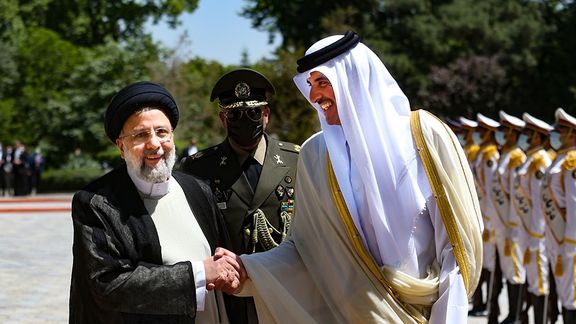Iran-US On Brink Of ‘Indirect’ Nuclear Talks In Qatar

Iran’s Tasnim news reported Monday that lead negotiator Ali Bagheri Kani was heading to Doha Tuesday for indirect talks with the US over the 2015 nuclear deal.

Iran’s Tasnim news reported Monday that lead negotiator Ali Bagheri Kani was heading to Doha Tuesday for indirect talks with the US over the 2015 nuclear deal.
This came with expectations firming of indirect United States-Iran talks over restoring the agreement – the JCPOA, Joint Comprehensive Plan of Action – but with no indication of how gaps would be bridged.
“Resuming negotiations doesn’t mean we’re closer to agreement,” Mohammad Marandi, advisor to Iran’s nuclear negotiators and a de facto spokesman, told media outlets in Tehran. “America hasn’t yet taken the necessary decisions.”
Saeed Khatibzadeh, foreign ministry spokesman, said Monday Iran would “wait and see if the Americans will part with Trump’s legacy and if Borrell’s messages become a reality.”
In visiting Iran, Josep Borrell, the European Union foreign policy chief, announced Saturday that Iran and the US had agreed to renew contacts. Year-long talks in Vienna over reviving the 2015 deal, abandoned by President Donald Trump 2018, paused in March with a draft text largely agreed but with outstanding questions left for the US and Iran to resolve.
The Iranian media has reported that new indirect talks between the US and Iran will take place in Doha, Qatar, with EU representatives acting as go-betweens. In Vienna, formal talks involved all remaining JCPOA participants – China, France, Germany, Iran, Russia, and the United Kingdom – with US negotiators based in a separate hotel.
There have been suggestions in recent months that Qatar has tried to mediate. Talks between the US and Iran leading up to the 2015 deal – the JCPOA (Joint Comprehensive Plan of Action) – took place in Oman.
US officials have confirmed to American media outlets that Washington has agreed to a new round of talks, but have also been suggested their expectations were low.
The greatest obstacles in the Vienna talks centered on reaching agreement over which US sanctions contravened the JCPOA, which ruled out “discriminatory regulatory and procedural requirements in lieu of the sanctions,” and exactly how Iran’s nuclear program, expanded incrementally since 2019, would be brought back within JCPOA limits.
Israeli ‘sabotage’
Tehran has specifically argued that some sanctions introduced by Trump under other rubrics, including ‘terrorism,’ were designed to stymie efforts to restore the JCPOA. Biden administration officials, although committed to restoring the deal, have accused Iran of thereby introducing demands not relevant to the JCPOA.
In recent days, there have been suggestions of some compromise over the US listing of Iran’s Revolutionary Guards, part of its armed forces, as a ‘foreign terrorist organization.’ While Tehran has requested this rescinded – it was done by Trump in 2019 – there has been criticism of such a proposed move by politicians in Washington.
Borrell’s apparent success in reviving the talks provoked a spat in Israel, with Defense Minister Benny Gantz taking to Twitter to dismiss reports that Israeli military intelligence chiefs favored restoring the JCPOA.
Politico reported Sunday that Israeli Foreign Minister Yair Lapid had told Borrell he was “very disappointed” with the EU foreign policy chief’s mission to Tehran, calling it a “strategic mistake that sends the wrong message to Iran.” Politico suggested Brussels in turn saw Lapid as trying to “sabotage the negotiations.”